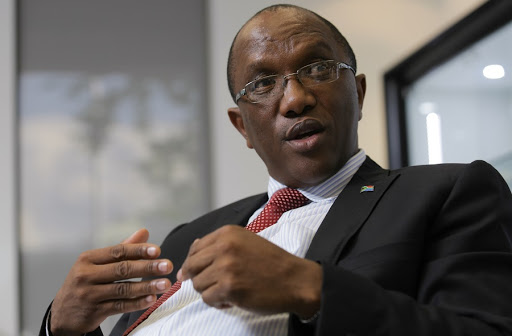LUCAS LEDWABA
THE Free State’s municipalities continued what seems to be an unstoppable free fall into the abyss of poor financial management and administration as local government structures failed yet another test with the auditors.
It would have made little difference had Auditor General Kimi Makwetu simply dusted off the grim report he delivered on municipal audit outcomes last year, and presented it again with a few amendments here and there on Wednesday.
Makwetu, who has for the past six years at the helm been expressing the same frustration over a lack of accountablity and adherence to basic accounting principles, would have been forgiven for throwing in a few expletives to accompany some of the unfathomable, lacklustre performances by municipalities.
Take the case of Free State for example.
Last year, Makwetu wrote on his findings on the province’s 2017/18 outcomes: “The Free State local government environment displayed a total breakdown in internal controls as the province’s political and administrative leadership, yet again, exhibited no response to improve its accountability for financial and performance management.”
He continued to say: “Consequently, municipalities’ financial health continued to deteriorate from a net current liability position (where current liabilities exceed current assets) of R4,8 billion in the prior year to R6,1 billion in the current year.”
Yesterday’s outcome on the province was pretty much the same or even worse.
Makwetu said the audit outcomes in the province continued to regress for the third consecutive year and that 10 municipalities did not submit financial statements on time.
He said this was even more than in prior years, which resulted in eight audits not having been completed by the time of the AG’s general report.
Makwetu said additionally, three municipalities received disclaimed opinions, which means that almost half of the municipalities in the Free State had not accounted for the manner in which they used taxpayers’ money in 2018-19 or did it so poorly that their financial statements cannot be trusted.
Critically, he added: “The outcomes were characterised by a lack of basic financial disciplines, an unwillingness to comply with legislation, and a general disregard for internal controls and accountability.”
If this is not enough to place the entire province under administration and reign in errant officials under the amended powers given to the AG last year, then nothing ever will.
The Free State is just but an example of an ailing local government sector.
Makwetu’s office audited 257 municipalities and 21 municipal entities.
He said the audits of 28 municipalities had not yet been completed by the 31 January 2020 cut-off date.
Disturbingly, the AG’s office noted that over the three-year period, the audit outcomes of 76 municipalities regressed with those of only 31 improving.
Among the poor performers was the country’s centre of corruption and misgovernance, the Eastern Cape.
Makwetu painted a rather disturbing picture of the province whose citizens continue to suffer as a result of poor service delivery and where last month, the Grahamstown division of the Eastern Cape High Court ordered the Inxuba Yethemba municipality to pay power supplier Eskom a debt of R127 million.
The case had been brought by the Cradock Business Forum, Middelburg Ratepayers Association and Cradock Ratepayers Association to force the municipality and Eskom to sort out their troubles to avoid having their electricity supply cut off.
Makwetu found that in the Eastern Cape “there were dysfunctional control environments; extensive disorder in accounting records; prolonged vacancies in key positions and instability in councils; poor procurement processes; no consequences for poor performance and transgressions; and unreliable reporting on municipal finances and programmes.”
The province’s irregular expenditure bill clocked at R2,5 billion while a further R4,2 billion was flagged for audits finalised subsequent to the cut-off date for the current report.
Mpumalanga, with an irregular expenditure bill totalling R1.09 billion also found itself in the hall of shame with Makwetu saying noting that “deteriorating accountability and financial management coupled with weakened oversight is at the centre of the significant regressions in audit outcomes in the province – six municipalities regressed and only two improved.”
Despite promises by premier Zamani Saul to clean up the province’s administration ala Tanzania’s John Magufuli when it took over the reins last year, the Northern Cape failed to impress.
Makwetu said of the province which incurred R390 million in irregular expenditure: “The province is in a prolonged state of undesirable audit outcomes, with yet another overall regression – six municipalities regressed and only three improved.” He blamed “little response by the leadership to the messages of the Auditor-General of South Africa (AGSA) to implement preventative controls.” The North West retained its place in the hall of shame.
“The [North West’] regression in audit outcomes completes a three-year downward trajectory in the province: nine municipalities received disclaimed opinions and eight received qualified opinions. The availability of documents or evidence to support financial activities remained a vast challenge across the municipalities, as evidenced by the number of repeat disclaimed opinions.”
Makwetu’s report comes just a week after parliament’s chairperson of the select committee on cooperative governance and traditional affairs, water and sanitation and human settlements China Dodovu expressed his frustration at the continuing poor performance by municipalities before a sitting of the National Council of Provinces.
Dodovu expressed decried the lack of action and accountability against errant municipalities and officials and asked if the house would sit next year to discuss the same issues and problems.
It’s a shame that even after such sterling work through the years, Makwetu, whose contract comes to an end at the end of this year, would be leaving behind a local government in total shambles.
His last report however, leaves no doubt the houses of parliament would still be, as Dodovu vented, still discussing the same issues and problems when he’s gone.
(Compiled by Inside Politics staff)

